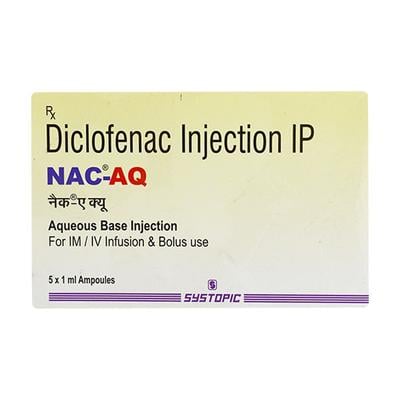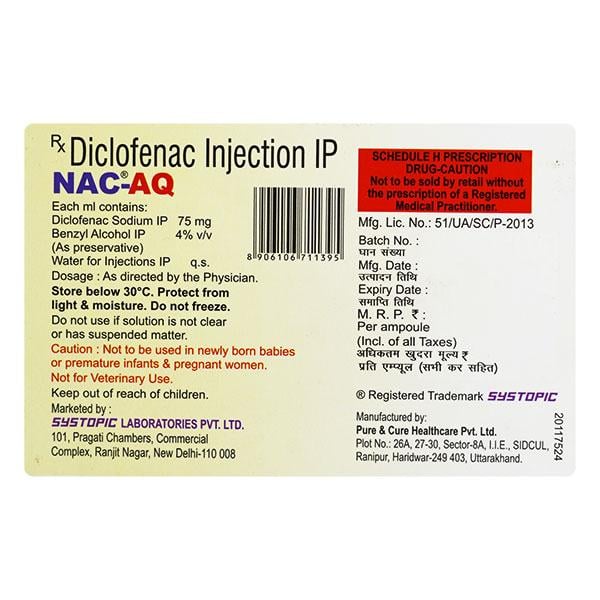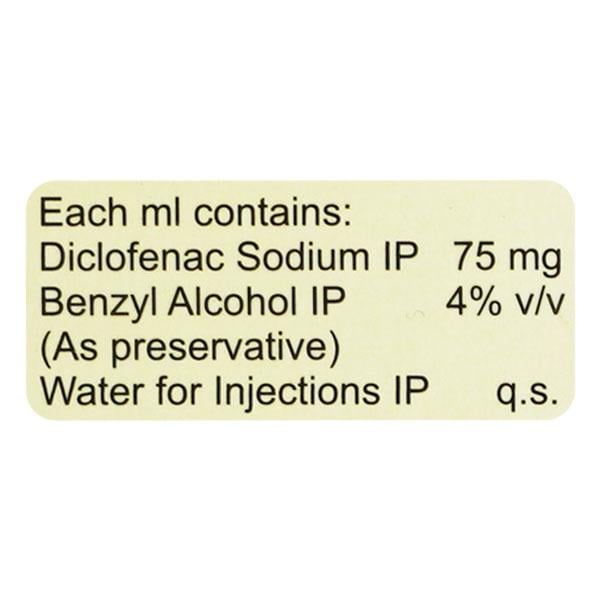

Netmeds First Membership
Quick Links
Introduction About NAC AQ
NAC AQ contains Diclofenac, which belongs to a group of medicines called Nonsteroidal anti-inflammatory drugs (NSAIDs). NAC AQ is used to manage various painful conditions such as flare-ups of joint or back pain, gout attacks (a common and complex form of arthritis that is characterized by sudden, severe attacks of pain, swelling, redness, and tenderness in one or more joints), pain caused by kidney stones or due to injuries, fractures, or trauma. It is also used to manage or manage pain following an operation.
Before receiving NAC AQ, inform your doctor if you have any allergies, heart, liver, or kidney problems, clotting disorders, high blood pressure, diabetes, or any respiratory conditions; gastrointestinal problems such as stomach ulcers, ulcerative colitis, or Crohn's disease; and bleeding in the stomach with symptoms such as black stools or blood in vomit.
NAC AQ is not recommended for use in pregnant women, especially if you are more than 6 months pregnant, and it should be used with caution in breast-feeding women only if clearly advised by the doctor. NAC AQ is not recommended for use in children and adolescents (below 18 years of age). It should be used with caution in elderly patients.
The common side effects of receiving NAC AQ are nausea and discomfort, pain, redness, or lumps at the site of injection. Inform your doctor if any of the side effects get worse.
Uses Of NAC AQ
Manages painful conditions such as:
- Flare-ups of joint or back pain
- Gout attacks
- Pain caused by kidney stones or injuries, fractures, or trauma
- Pain following an operation
How NAC AQ Works
NAC AQ works by inhibiting the activity of certain enzymes (called cyclooxygenase (COX) enzymes), which manage the excess production of prostaglandins (which is responsible for causing pain and inflammation), thus helping in managing various painful conditions.
How to use NAC AQ
NAC AQ will be given to you only by a doctor or a nurse into a muscle (usually into buttocks as an intramuscular injection) or under the skin (usually into buttocks or thighs as a subcutaneous injection) or into a vein (usually in the upper arm as an intravenous injection). Your doctor will decide the correct dose and duration of NAC AQ for you depending upon your age, body weight, and disease condition.
Side Effects Of NAC AQ
Common
- Pain, redness, or lumps at the injection site
- Nausea
- Discomfort in the injection site
Uncommon
- Dizziness and headache
- Diarrhoea, vomiting and constipation
- Stomach pain, sickness, and loss of appetite due to an inflammatory stomach lining
- Problems in liver function
- Skin rash, itching
Rare
Inform your doctor immediately if you experience any of the following side effects while receiving NAC AQ:
- Signs of bleeding in the stomach or intestine (bleeding while emptying your bowel, blood in vomit, black or tarry stools)
- Persistent sore throat or high temperature
- Sudden change in urine production and colour
- Signs of severe allergic reactions (skin rash, swelling of the face, throat, or tongue, breathing difficulties, wheezing, and runny nose)
- Yellowing of the skin or white of the eyes
- Chest pain due to a serious allergic reaction called Kounis syndrome
- Serious skin rashes with itching, hives, bruising, painful red areas, peeling or blistering of skin, giant wheals (burning itchy swollen skin), affecting the mouth, lips, eyes, nose, and genitals.
- Bruising more easily than usual or having frequent sore throats or infections.
- Severe stomach pain or persistent problem with indigestion, heartburn, wind, and nausea or vomiting
- Mild cramping or tenderness of the abdomen, followed by rectal bleeding or bloody diarrhea (usually within 24 hours of the onset of abdominal pain)
How To Manage Side Effects
Constipation
Try to eat more high-fiber foods such as fresh fruit, vegetables, and cereals, and drink plenty of water. If this does not help, inform your doctor about receiving alternate management for constipation.
Diarrhea
Drink a lot of fluids, such as water, to keep yourself hydrated. Avoid eating high-fat or spicy foods. Inform your doctor if the symptom gets worse.
Headache
Drink an ample amount of water and avoid skipping meals. Get adequate rest. Try to be relaxed and stress-free. Apply pain-relieving balm on your forehead if necessary. Inform your doctor if the symptom does not improve.
Nausea And Vomiting
Stick to simple meals while receiving NAC AQ. Avoid eating oily, rich, fried, or spicy foods. Do not lie down or sleep immediately after eating. Inform your doctor if the symptom does not improve.
Stomach Pain
Try to rest and relax. Eat and drink slowly, or try to have smaller and more frequent meals. Keep a heat pad on your stomach. If the symptom does not improve, inform your doctor.
Warning & Precautions
Pregnancy
RiskyNAC AQ is not recommended for use during pregnancy, especially if you are more than 6 months pregnant, as it may affect the baby’s circulation or damage the baby’s kidney and may delay or prolong your labour. Your doctor may make a decision whether to continue the use of NAC AQ if you are pregnant or planning to get pregnant. Consult your doctor before receiving NAC AQ, as it may make it more difficult to get pregnant during management with this medicine.
Breastfeeding
Monitoring requiredNAC AQ should be used in breastfeeding women only if clearly advised by the doctor. Therefore, consult your doctor before receiving NAC AQ.
Driving and Using Machines
ContraindicatedDo not drive or operate any machines if you feel dizzy, tired, sleepy, or have blurred vision after receiving NAC AQ.
Kidney
Consult your doctorNAC AQ is not recommended for patients having or having had severe kidney failure and moderate or severe impairment in kidney function. It should be used with caution in patients having or having ever had kidney problems. Consult your doctor for advice before receiving NAC AQ.
Liver
Consult your doctorNAC AQ is not recommended for use in patients having or having had liver failure. It should be used with caution in patients with liver problems. Consult your doctor for advice before receiving NAC AQ.
Allergy
ContraindicatedNAC AQ is not recommended for use if you are allergic to diclofenac, aspirin, ibuprofen, or any other non-steroidal anti-inflammatory drugs (NSAIDs) (such as indomethacin).
Lungs
Consult your doctorNAC AQ is not recommended for use in patients with history of asthma. It should be used with caution in patients with chronic obstructive pulmonary disease (COPD) or hay fever. Consult your doctor for advice before receiving NAC AQ.
Heart Disease
Consult your doctorNAC AQ is not recommended for use in patients with severe heart failure, heart disease, or cerebrovascular disease such as heart attack, stroke, mini-stroke (TIA), or blockages to blood vessels to the heart or brain or who have had an operation to clear or bypass blockages and cerebrovascular bleeding. It should be used with caution in patients with angina, blood clots, high blood pressure, raised cholesterol, or raised triglycerides. Consult your doctor for advice before receiving NAC AQ.
Use In Pediatrics
ContraindicatedNAC AQ is not recommended for use in children and adolescents (below 18 years of age). Consult the child's doctor for advice.
Use In Geriatrics
Use with CautionNAC AQ should be used with caution in elderly patients. Your doctor may initiate the management with the lowest effective dose. Consult your doctor for advice before receiving NAC AQ.
Others
NAC AQ is not recommended for use if you:
- Have a history of bleeding in your stomach or bowels after you have taken NSAIDs
- Had two or more episodes of stomach or duodenal ulcers or bleeding in the digestive tract
- Have a blood clotting disorder
- Have a history of bleeding diathesis (specifically cerebrovascular bleeding)
- Had operation with high risk of haemorrhage
- Are dehydrated
- Have suffered from heavy blood loss
Before receiving NAC AQ, inform your doctor if you:
- Have smoking habit
- Have diabetes
- Have systemic lupus erythematosus or any similar problem
- Have porphyria or nasal polyps
- Are recovering from surgery?
- Are going to undergo gut surgery?
- Have any bowel disorders, including ulcerative colitis or Crohn’s disease
Interactions
A. Drug-Drug Interactions:
Before receiving NAC AQ, inform your doctor if you are taking any of the following medicines:
- Other medicines used to provide pain relief (Ex. aspirin, ibuprofen)
- Medicines used to manage high blood pressure (Ex. captopril, atenolol, metoprolol)
- Digoxin (used to manage heart problems)
- Methotrexate, pemetrexed (used in cancer management)
- Spironolactone, furosemide (used to remove excess water from the body)
- Lithium (used to manage mental health problems)
- Warfarin or heparin (used to manage or manage blood clots)
- Mifepristone (used to terminate pregnancy)
- Medicine used to suppress inflammation (Ex. prednisolone)
- Medicines used to suppress immunity (Ex. ciclosporin and tacrolimus)
- Citalopram (used to manage depression)
- Medicines used to manage bacterial infections (Ex. ciprofloxacin, ofloxacin)
- Phenytoin (used to manage seizures)
- Voriconazole (used to manage fungal infections)
- Medicines used to lower cholesterol (Ex. colestipol, cholestyramine)
- Sulfinpyrazone (used in gout management)
- Zidovudine (used in HIV management)
- Anti-diabetics such as metformin (used to manage diabetics)
- Deferasirox (used to manage iron overload due to blood transfusions)
Overdosage:
NAC AQ will be administered to you only by a doctor or a nurse in a hospital, and so it is unlikely to receive an overdose. However, consult your doctor or nurse if you experience any unusual symptoms such as nausea, vomiting, stomach pain, stomach or bowel bleeding, dizziness, tinnitus (ringing noise in ears), and occasionally convulsions (fits). In severe cases, it may cause kidney or liver damage (signs include difficulty passing urine or passing more water than usual, tiredness, muscle cramps, swelling in your hands, feet, or face, nausea or vomiting, and yellowing of the skin).
Synopsis
| Drug | : | Diclofenac |
| Pharmacological Category | : | Cyclooxygenase Inhibitors |
| Therapeutic Indication | : | Pain relief |
| Dosage Forms | : | Tablet, Capsule, Dispersible tablet, Injection, Eye drops, Gel, Spray, Solution, Liniment, Suppository, Ointment, Transdermal patch, Spray |
More Information
Storage
- Store NAC AQ at room temperature
FAQs About NAC AQ
Q: What is NAC AQ used for?
A: NAC AQ is used to manage various painful conditions such as flare-ups of joint or back pain, gout attacks, pain caused by kidney stones or due to injuries, fractures or trauma. NAC AQ is also used to manage or manage pain following an operation.
Q: What common side effects are seen with NAC AQ?
A: The common side effects of receiving NAC AQ are nausea and discomfort, pain, redness or lumps at the site of injection. Inform your doctor if any of the side effect gets worse during or after management with NAC AQ.
Q: Can NAC AQ be used in breast-feeding women?
A: NAC AQ should be used in breastfeeding women only if clearly advised by your doctor. Consult your doctor before receiving NAC AQ if you are breast-feeding your child or wish to breast-feed if your baby is born prematurely.
Q: Can NAC AQ be used in elderly patients?
A: NAC AQ should be used with caution in elderly patients. Your doctor may initiate the management with the lowest effective dose. Consult your doctor for advice before receiving NAC AQ.
Q: Is NAC AQ safe to use in patients with liver problems?
A: NAC AQ is not recommended for use in patients with liver failure. It should be used with caution in patients with liver problems and your doctor may monitor your liver function test during management with this medicine. Consult your doctor for advice before receiving NAC AQ.
Q: Is NAC AQ safe during pregnancy?
A: NAC AQ is not recommended for use during pregnancy, especially if you are more than 6 months pregnant, as it may affect the baby’s circulation or damage the baby’s kidney and may delay or prolong your labour. Your doctor may decide whether to continue the use of NAC AQ if you are pregnant or planning to get pregnant. Consult your doctor before receiving NAC AQ, as it may make it more difficult to get pregnant during management with this medicine.
Q: Can NAC AQ be used in children?
A: NAC AQ is not recommended for use in children and adolescents (below 18 years of age). Consult the child's doctor for advice.
Q: Who should not use NAC AQ?
A: NAC AQ is not recommended for use if you have a history of bleeding in your stomach or bowels after you have taken NSAIDs, stomach or duodenal ulcers or bleeding in the digestive tract, blood clotting disorders, history of bleeding diathesis (specifically cerebrovascular bleeding), history of operation with high risk of haemorrhage, dehydration, history of heavy blood loss, allergic to diclofenac, aspirin, ibuprofen or any other non-steroidal anti-inflammatory drugs (NSAIDs) (such as indomethacin), or if you have severe kidney failure and moderate or severe impairment in kidney function, liver failure, history of asthma, severe heart failure, heart disease or cerebrovascular disease such as heart attack, stroke, mini-stroke (TIA) or blockages to blood vessels to the heart or brain or had an operation to clear or bypass blockages and cerebrovascular bleeding.
Q: How NAC AQ is given?
A: NAC AQ will be given to you only by a doctor or a nurse into a muscle (usually into buttocks as an intramuscular injection) or under the skin (usually into buttocks or thighs as a subcutaneous injection) or into a vein (usually in the upper arm as an intravenous injection). Your doctor will decide the correct dose and duration of NAC AQ for you depending upon your age, body weight, and disease condition.
Q: What precautions must be taken while using NAC AQ?
A: Before receiving NAC AQ, inform your doctor if you have kidney problems, liver problems, chronic obstructive pulmonary disease (COPD) or hay fever, angina, blood clots, high blood pressure, raised cholesterol or raised triglycerides, have a smoking habit, diabetes, systemic lupus erythematosus or any similar problem, porphyria or nasal polyps, are recovering from surgery, scheduled for gut surgery, or have any bowel disorders, including ulcerative colitis or Crohn’s disease.
References
1. KD. Tripathi. Nonsteroidal anti-inflammatory drugs and antipyretic-analgesics. Essentials of Medical Pharmacology. Seventh Edition. 2013. Page – 192 & 210
2. Gan, Tong J. Diclofenac: an update on its mechanism of action and safety profile. Current medical research and opinion. May 2010. [Accessed on 26th July 2024] https://www.tandfonline.com/doi/abs/10.1185/03007995.2010.486301
3. Altman, Roy, Bill Bosch, Kay Brune, Paola Patrignani, and Clarence Young. Advances in NSAID development: evolution of diclofenac products using pharmaceutical technology. Springer link. May 2015. [Accessed on 26th July 2024] https://link.springer.com/article/10.1007/s40265-015-0392-z
4. IBSA Farmaceutici Italia Srl. Electronic Medicines Compendium (EMC). [Revised in September 2020]. [Accessed on 26th July 2024] https://www.medicines.org.uk/emc/files/pil.9399.pdf
5. Hospira, Inc., U.S. Food & Drug Administration. [Revised in December 2014] [Accessed on 26th July 2024] https://www.accessdata.fda.gov/drugsatfda_docs/label/2014/022396lbl.pdf
Useful Diagnostic Tests
- Complete Blood Count (CBC)/ Hemogram
- Liver Function Test (LFT)
- Rheumatoid Factor (RF)/RA Test Rheumatoid Arthritis Factor, Qualitative
- Basic Arthritis Care
- Extended Arthritis Care
- Advance Bone Care
- Comprehensive Bone Care
- Frequent Pain Check Package
- Autoimmune Arthritis Panel
- Arthritis Profile – Advanced










